
Why set a novel in 1979? Because 1979 seemed like a seminal moment in history, fraught with endless fictional possibilities. Jimmy Carter was in the White House, the Iranian hostage crisis was in full bloom, there had been a nuclear accident at Three Mile Island. Disco was dying, and so was punk rock in its hardcore form, culminating with the death of Sid Vicious. And, yet, punk's more popularized version had reached our shores with the release of the Clash's
London Calling. Women's oppression seemed to be waning, made concrete by Judy Chicago's
The Dinner Party, shown that year at the San Francisco Museum of Modern Art. Culturally, the world was in bloom: Styron's
Sophie's Choice and Mailer's
The Executioner's Song were released in 1979. So was
Manhattan,
The Rose,
Apocalypse Now and
Breaking Away. Then, on Christmas Day, Soviet deployment of its army into Afghanistan began. And, on January 4, 1980, Carter announced the U.S. grain embargo against the Soviet Union. Which is when my novel begins.
With the grain embargo? Every person involved with this book has raised an eyebrow and asked me to please not pin a novel's hopes and dreams on embargoed grain and President Carter. But the grain embargo! It had grand significance in my life because my father is an economist who worked in foreign food policy in Washington, D.C., where I grew up. When the embargo was announced ? I was nine at the time ? it was a big deal in our house.
And it's what started me writing this particular book, strangely enough, because as a kid who knew the difference between USAID and USDA (an effect of a Washington, D.C., childhood), and as a girl growing up in a world informed by images of thinness, I was intrigued by the way food played out domestically, in the house, and also outside, in the real world. That compels me now, as a grown-up writer.
Well, in 1979, according to my father, the outside world was on the brink of starvation, though this was thanks to Nixon. But now Carter was going to starve nations ? in this case, a punitive act against Soviet aggression in Afghanistan ? into submission. I am not an economist, but I do know now that it doesn't work this way. An embargo is hard to enforce. Even U.S. allies could sneak the "enemy" grain. And if we knew the grain embargo was coming, mightn't the Soviets? They could have been stockpiling it in preparation. But even our most technologically advanced satellite imaging system at the time ?Landsat sensors ? couldn't discern if this was true. The long and short of it was that for the first time in history a nation was using food to swing politics. We were using food as a weapon.
Food as a weapon. World starvation. The Soviet Union. Terrorism in Iran. An Invasion in Afghanistan. The more I wrote my way into the politics of that era, the more it was impossible to ignore the way history repeats itself, and, in this case, as it has proved to be in fashion, in 30-year cycles. (Footage from that era might surprise you: everyone ? standing around in their tight gym clothes, their sneakers, their loose, big hair ? looks like a version of Michael Cera.)
So, here we are now, the start of 2010, and Afghanistan hasn't exactly faded from memory. I remember sitting around the dinner table ? and that this book deals so much with food and its political implications is partially because most of the high drama in my house took place at that dinner table ? and hearing this kind of talk between my parents. Well, we're handing the Soviet Union their Vietnam, aren't we? We're funding the mujahideen. The anti-communists. Judy, pass the salt.
 We see clearly now that the Soviet invasion of Afghanistan was a failure; it can be argued fairly easily that it tore apart that country and helped paved the way for religious fanaticism and that the fear and hate that resulted from the upheaval made Afghanistan and neighboring Pakistan a base for terrorists. That the U.S. helped fund the Afghan resistance ? the mujahideen were anti-Communist but they soon became resistance fighters, proclaiming Jihad on the Soviets ? might have seemed like the right idea at the time. Now, of course, as the U.S. goes into those harsh, rugged mountains to try to undo that rage, soldiers are being met with U.S. guns.
We see clearly now that the Soviet invasion of Afghanistan was a failure; it can be argued fairly easily that it tore apart that country and helped paved the way for religious fanaticism and that the fear and hate that resulted from the upheaval made Afghanistan and neighboring Pakistan a base for terrorists. That the U.S. helped fund the Afghan resistance ? the mujahideen were anti-Communist but they soon became resistance fighters, proclaiming Jihad on the Soviets ? might have seemed like the right idea at the time. Now, of course, as the U.S. goes into those harsh, rugged mountains to try to undo that rage, soldiers are being met with U.S. guns.
"Our people are losing faith," Carter said in his famous 1979 speech about the country's malaise, just four months before the Soviets invaded Afghanistan, just as "we" knew they would. It's a contrast to the way our president ? and many among you have compared Barack Obama to Jimmy Carter ? now speaks. Or is "Change We Can Believe In," the slogan that helped deliver him the White House, just that same notion, turned around?
In July 2008, I was coming to the end of my novel ? which, at its heart, is really about a family living within the context of the world, just as we are all here, now ? and, in a pre-recession panic, food prices peaked. Even rice ? that old standby ? was expensive, in the same way prices skyrocketed at the end of the seventies, in anticipation of the embargo.
We were all told in 2008, the peak in prices had something to do with ethanol and oil. Did I mention the gas lines in 1979? For those of you too young to remember, they wound around the block. And, for those of you who were there, that was some line, with a simple cause: when the Ayatollah gained control of Iran early in 1979 there were huge protests against the Iranian oil sector. Oil was still exported, but at a reduced quantity, forcing prices up. In stepped Saudi Arabia ? we would certainly be seeing Saudi Arabia again ? to offset loss, and though the loss was not significant, panic ensued, driving up the price. Well, for anyone who tried to drive somewhere last summer, I'm sure the staggering price of gas is not something you'll soon forget.
Needless to say. The links are incredible, only in that they're not incredible. But what's amazing to me, not as a historian or an economist or a politician but as a fiction writer who sees the world filtered through novels and stories (and sees the world clearly nonetheless), is that there is rarely any public talk made of that connection. Yes, we say, we really need to rid ourselves of this dependence on foreign oil. It's really bringing us down. We really need to have jobs here. We need to pay the farmers so that they can grow food here, HERE. While those in the fashion industry might say the bellbottom is sure to return (well, maybe not the bellbottom), we are a country that makes massive historical decisions based on the future. Really, though ? and this is largely what I was attempting to do with my characters in this novel ? the past sits next to us at every moment. We're tethered to the past as a nation, just as we're chained to our happy or our sad childhoods.
The parallels with life and fiction when writing a novel are always uncanny. A character stubs her toe, and, oh my god, I just stubbed my toe, too! Can you believe it? Truth imitates fiction. And, of course, these things happen on a deeper, more complicated level, too. But as I did the research that would allow my characters to slide their chairs out from under the dinner table and make their way into the world to discover punk rock or socialism or LSD or plain old fashioned romance and betrayal, to let my characters live in a world I was too young to remember, I kept getting tripped up. I found myself flipping back through pages or searching for more reliable websites, but they all told me the same thing. You are not insane: the history has repeated itself. Thirty years from now, which incidentally puts us at 2040, when people start wearing zippered hoodies again, and go back to hardcover books and watching movies in 3-D, where will we be? And if I were then to set my novel now, would I already have all the answers?